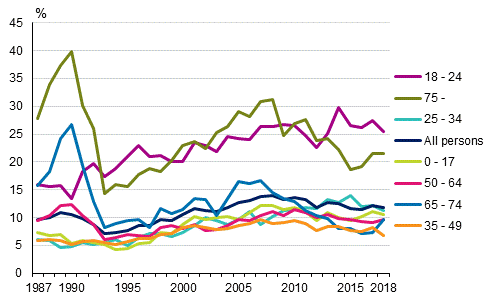Published: 12 March 2020
Number of persons at risk of poverty 640,000 in 2018
The sample data of Statistics Finland's income distribution statistics indicate that 640,000 or 11.8 cent of the household population belonged to households at risk of poverty in 2018. The number and share of persons at risk of poverty fell slightly from the previous year, when the number of persons belonging to households at risk of poverty was 654,000. The at-risk-of-poverty rate has varied in the past five years on both sides of 12 per cent.
At-risk-of-poverty rates by age of person 1987–2018, %

The relative risk of poverty has varied in the past ten years between 623,000 and 728,000 persons, when the used at-risk-of-poverty threshold is 60 per cent of median income. In 2018, the at-risk-of-poverty threshold was EUR 14,970 per year for one-person households, that is, around EUR 1,250 per month.
Risk of poverty indicator describes the relative income differentials of medium-income and low-income groups, so the development of persons at risk of poverty depends not only on the income development of low-income households, but also on the development of median income. Persons are classified as being at-risk-of-poverty when the household's disposable monetary income per consumption unit is below 60 per cent of the national median income. Households’ median income from which the at-risk-of-poverty threshold is counted was EUR 24,950 in 2018.
The at-risk-of-poverty rate of persons at retirement age has grown in the past few years. The growth of risk of poverty of elderly people comes mostly from single-person households and those aged 65 to 74. Around every tenth of persons aged 65 to 74 was at risk of poverty in 2018, that is, fewer than average for the population. Good 21 per cent of persons aged 75 or over were at risk of poverty. The median income of pensioner households aged 65 to 74 decreased slightly in 2018, and median income improved somewhat for those aged 75 or over. It is typical of pensioners at risk of poverty that they are often quite close to the at-risk-of-poverty threshold, that is, their income is more than 50 but under 60 per cent of the national median income.
The risk of poverty has in turn decreased on a whole slightly among working-age people aged 18 to 64. However, being at risk of poverty is most common among young people aged 18 to 24: around every fourth of them is a member of a household at risk of poverty. Among working-age people, being at risk of poverty is experienced most by unemployed persons of whom around 40 per cent were at risk of poverty in 2018, and students of whom nearly 29 per cent were at risk of poverty.
The development of the at-risk-of-poverty rate among children generally follows that of the total population. With regard to annual variations, children's risk of poverty has in recent years been slightly over 10 per cent, on average. Among families with children, the income level of two-adult households is better, and the risk of poverty is lower than in one-parent households, where median income is weakest of population groups in addition to one-person households. More detailed information on the risk of poverty and income of population groups is available in the reviews of this publication.
Source: Income Distribution Statistics 2018, Statistics Finland
Inquiries: Kaisa-Mari Okkonen 029 551 3408, Usva Topo 029 551 3036
Director in charge: Jari Tarkoma
- Tables
-
Tables in databases
Pick the data you need into tables, view the data as graphs, or download the data for your use.
Updated 12.03.2020
Official Statistics of Finland (OSF):
Income distribution statistics [e-publication].
ISSN=1799-1331. Income differentials between population subgroups and risk of poverty 2018. Helsinki: Statistics Finland [referred: 4.4.2025].
Access method: http://stat.fi/til/tjt/2018/06/tjt_2018_06_2020-03-12_tie_001_en.html

